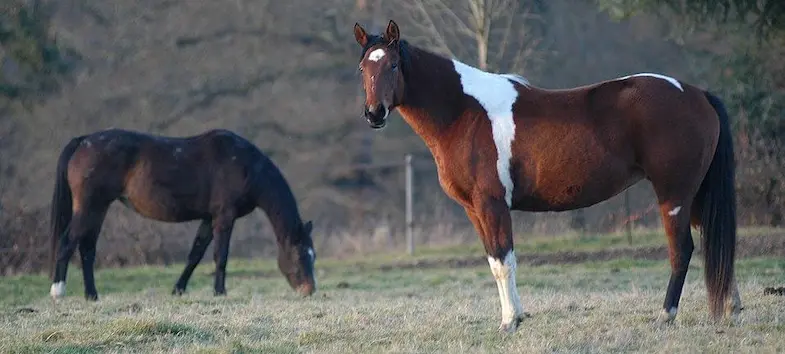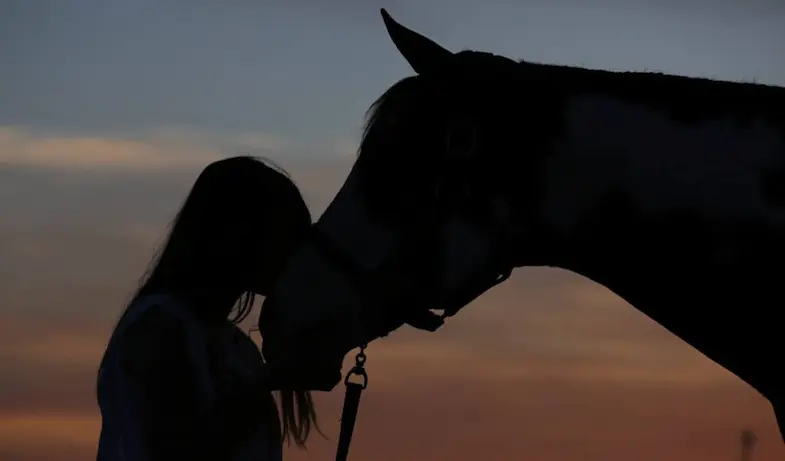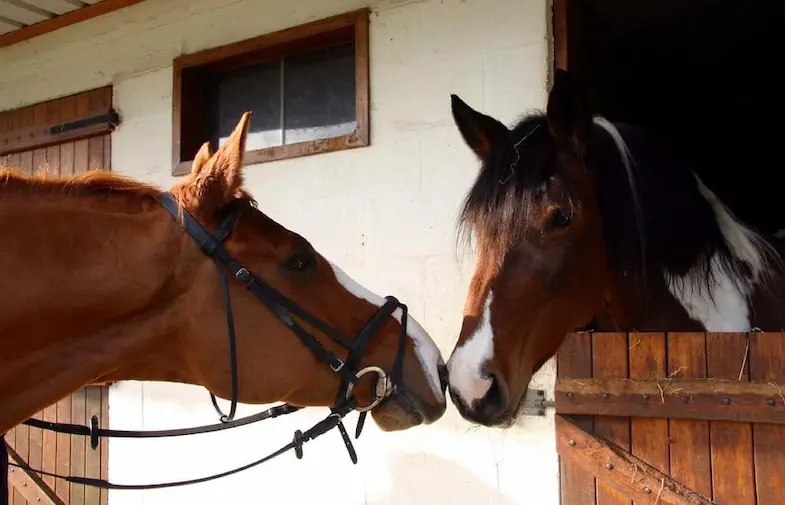We tell our horses every day that we love them but often ask if they really love us back. The good news is that yes they absolutely do but recognizing what they’re telling us can be difficult, especially if you’re not familiar with their language.
Horses are extremely affectionate creatures that routinely tell each other how they feel, whether it’s a mare nuzzling her foal or two field mates mutually grooming each other. A horse may not feel love in the same way that we do, to them it’s more important to feel safe and relaxed, but they do still feel similar emotions to us. The key is to understand what they’re saying, what it means, and ideally how to respond (if possible) to them in their language.
1) Your horse chooses to come to you
When your horse leaves his friends and walks straight up to you as soon as you enter the field its a very good sign that not only does he like you but he enjoys your company, if he stops eating to do this he’s actually telling you that he loves you more than his food. And we all know how important THAT is to horses!
What he’s telling you: By walking up to you without being asked your horse is telling you that he feels relaxed around you and enjoys your presence. Being predated animals means that horses feel safer when they’re in a group so if your horse is leaving his friends to come over to you he knows that you’ll look after him and will stop him from being eaten.
When this might not be the case: If you give your horse a treat as soon as you walk into the field then he’s obviously going to walk up to you regardless of how he feels. The same is true if you only go into the field to bring him in for food. Just because you do this though it doesn’t mean that your horse doesn’t love you, it’s just that he’s so smart he’s learned your routine (and what the chances of you having a treat are). Try to vary your routine a bit and stop feeding him treats as soon as you arrive and he’ll soon realize that just because you’re there it doesn’t mean he’s automatically going to get food.
2) Your horse turns their head and ears to you
Most horses will turn their head and ears to the nearest or loudest sound but if your horse turns his head and ears towards you, even if you’re not talking to him, or paying him any attention then he’s telling you that he respects you and respect is extremely important to horses.
What he’s telling you: By constantly following your movements your horse is watching and waiting for you to give him instructions. This doesn’t mean that he’s stupid and doesn’t know what to do unless you tell him it’s actually the opposite – horses are social animals with a clear hierarchy and by watching you he’s acknowledging that you’re higher than him and that if he pays attention to what you’re doing and telling him he’ll be kept safe.
When this might not be the case: Horses are naturally inquisitive and will notice most things that go on around the yard but if you’re the only person there and your horse can’t see anything else (especially other horses) then he’ll watch what you’re doing, sometimes just out of boredom. Make sure your horse has got plenty of distractions such as other horses to interact with or toys to play with (this is also beneficial to your horse’s mental wellbeing) and if he still pays attention to you you know he loves and respects you.
3) Your horse follows your instructions
If you’ve ever watched when a new horse is introduced to a herd you’ll notice how they all (even the lowest horse) try to establish their dominance. In fact, this happens all of the time, horses spend a lot of time establishing who’s the boss and they’re no different with us so if your horse is following your instructions, even if they’re not particularly forceful, then he knows you’re dominant. This might sound aggressive but it’s how horses survive within the herd (and especially in the wild), they’ll pay attention to the dominant horse (or person in this case) and will watch you for signs of threat, as well as for reassurance.
What he’s telling you: By seeing you as the leader or boss he’s telling you that you’re the dominant one and that he respects you, he’ll also look to you to lead him and keep him safe which will make him feel closer to you.
How to reciprocate: Don’t abuse your horse’s trust by giving him confusing or misleading signals. Make sure you’re clear about what you’re asking your horse to do, for example, don’t ask your horse to trot over poles and then settle for him only plodding over a few of them. It might seem like you’re being harsh but you’re actually reinforcing your dominance which will strengthen the bond you both have.
4) Your horse is relaxed around you
If your horse seems like he’s half asleep when you’re around don’t be offended, thinking that he’s bored, he actually feels so safe when you’re around that he can relax. The classic signs of a relaxed horse are soft, around nostrils, a slightly droopy lower lip, a relaxed lower jaw (sometimes even dribbling), and gentle sighing.
What he’s telling you: Horses are flight animals that live a lot of their life in a state of alertness so if your horse is relaxed then he feels safe when you’re around. He knows that you’ll protect him and won’t let any scary monsters attack him.
How can you make a horse love you?
Horses will want to check anything (or anybody) new out before they decide whether or not to run, so if your horse feels relaxed around you he’ll very quickly decide that you’re not a threat and will therefore want to be around you. This is why it’s so important to be calm, relaxed, and patient around your horse, he’ll feed off of you so if you’re always tense he will feel more on edge.
If you’re always calm around your horse he’ll eventually relax and bond with you, he’ll also look to you to take care of him which is a great endorsement from a horse.
When a horse nudges you is it a form of affection?
Many people will agree that when your horse nudges you he’s telling you that he loves you but this might not be the case. To answer the question properly you need to understand the circumstances around when your horse does it and how gentle he’s being. If you normally have treats in your pockets then it is probably because he’s expecting them, also if your horse always nudges you while you’re untacking him it could be he’s getting impatient. In these cases it’s unlikely that your horse is nudging you out of affection, on the other hand, if he does it when you go to stroke or groom him then he’s returning the affection you’re showing him.
How to recognize affection between horses
Horses show affection to each other in a variety of different ways but the most common way is to simply spend time with each other. If you watch a group of horses for any period of time you’ll soon see that despite being a big group of horses it is in fact a collection of smaller ‘mini herds’. Each of these smaller herds will consist of the same horses.
Social grooming
Grooming is a great form of communication between horses, not only does it help to establish the pecking order (as well as to remove parasites) but it’s also used for bonding and as a way of displaying affection. While they are often using their teeth to ‘nibble’ each other it’s done gently and reassures both parties that they’ll be safe, this type of social grooming is known as allogrooming.
You can’t groom your horse in the same way as his field mates on your own but with the help of a tennis ball, you can. Cut a quarter out of the ball and then place it in the palm of your hand, you can then ‘squeeze’ it along your horse’s back, withers, and neck. This will give your horse the impression you’re nibbling him which will increase your bond and tell him that you love him in his language.
Hugging and kissing
Just as we do horses can also show each other affection by hugging, they do this by putting their heads over each other’s neck and gently hugging with their neck, they can also ‘kiss’ each other although they do it slightly differently to us. Known as sharing air, it’s an intimate activity where they put their noses together and literally share the air they’re breathing.
Sounds
As well as body language, horses also communicate with each other by using sounds, okay they may not have fully formed words like we do but they have sounds that mean the same. When a horse makes a low soft nickering sound they’re actually showing affection, they’ll often greet each other by nickering too.
Nuzzling
Have you ever noticed how a mare will softly nuzzle her foal while he rubs himself against her legs (or head if he can reach)? By doing this they’re not only bonding but are also signaling to each other their affection.
I hope you found this article helpful. If you did I’d be grateful if you could share it please as it would really help me.
Recommended products
Over the years I have tried hundreds of different horsey products, from various blankets and halters to different treats. Some I’ve loved, others I’ve hated but I thought I’d share with you my top all-time favorite products, the ones I never leave the yard without. I’ve included links to the products (which are in no particular order) that I really think are great.
- Horse Knots by Reference Ready – If you’re like me and enjoy pocket reference guides then you’ll love this knot tying guide. These handy cards can easily fit in your pocket or attach to the saddle for quick reference. They’re waterproof, durable and are color coded to make them easy to follow.
- Mane ’n Tail Detangler – Even if you never show your horse you’ll need to detangle his tail from time to time (and possibly his mane too) which is always a challenging chore! I’ve found that if I run a little bit of detangler through my horse’s tails every few days it stops them from getting matted up and makes combing them easy, even if they’re coated in mud. I don’t know if I should admit to this or not but it also works wonders on my hair.
- TAKEKIT Pro clippers – Over the years I’ve tried a lot of different clippers and while some were obviously better than others I found these to be by far the best. They are heavier than a lot of other clippers but for me, that’s a good thing, it makes them feel more sturdy and hardwearing. On top of that they have a range of speeds so are just as good for clipping your horse’s back as they are his face. I also like the fact that they come in a handy carry case but that’s not for everybody. The company that makes them is super good and incredibly helpful too, a real bonus these days. The only thing I wasn’t keen on was the fact that it doesn’t come with any oil, but that’s not a major problem as it’s not difficult to buy lubricant.
- Shire’s ball feeder – There are so many boredom buster toys out there but I like to use these every day, regardless of whether or not my horses are bored. I find that it helps to encourage my horses to problem solve by rewarding them with treats (or pieces of fruit) but it also mimics their natural grazing behavior which helps to keep them calm and de-stressed.
- Horse safe mirror – This is a strange one that many people are surprised about but I like to put horse safe mirrors in the trailers as well as in the quarantine stalls. It helps to prevent the feeling of isolation by giving the impression of other horses being around. Being herd animals horses can get extremely stressed when they feel that they’re on their own but with these stick-on mirrors, they believe that at least one other horse is with them.
- Rectal thermometer – I know this isn’t glamourous at all but it’s vital for your horse’s well-being to be able to check their temperature and a rectal thermometer is the easiest way of doing this which is why I’ve added it to the list.
Shopping lists
I’ve also put together a few shopping lists of essential items that I’ve found helpful over the years. I’ve broken the lists down into different categories rather than put everything in one massive list 😉




